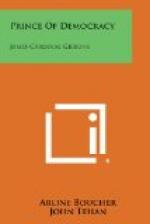|
This section contains 375 words (approx. 2 pages at 300 words per page) |
Encyclopedia of World Biography on James Gibbons
James Gibbons (1834-1921), an American Roman Catholic cardinal, did much to reconcile the Church with national institutions when American Catholicism was faced with momentous transformation and crisis.
James Gibbons was born on July 23, 1834, in Baltimore, Md., of Irish immigrant parents. His boyhood was spent in Ireland, where he received his education; he returned to America to study at a Catholic college and seminary in Baltimore. Ordained in 1861, he rose rapidly in the councils of the Church and by 1868 was consecrated vicar apostolic of North Carolina.
In 1877 Gibbons became archbishop of Baltimore, the oldest and most prestigious archdiocese in the United States (which included Washington, D.C.). In 1886 he was created a cardinal, the second American to receive the red biretta. From that time until his death in 1921, he was the unofficial leader of the Church in the United States, honored and extolled by all Americans. In 1917 Theodore Roosevelt wrote to him, "Taking your life as a whole, I think you now occupy the position of being the most respected, and venerated, and useful citizen of our country." When the United States entered World War I, Gibbons gave unstinted support to President Woodrow Wilson.
Gibbons was a staunch defender of the Church, and his The Faith of Our Fathers (1876) was one of the most successful apologetics written in the English language. Yet he respected all faiths, and at the 1893 Parliament of Religions he led the assembly in the Protestant version of the Lord's Prayer, to the consternation of Catholic conservatives. Gibbons successfully defended the Knights of Labor (a union considerably Catholic in membership) from papal censure, thereby winning a reputation as labor's friend, though in fact he deplored class consciousness and condemned industrial violence. He unalterably opposed the fragmentation of American Catholicism into ethnic divisions. He championed the American separation of church and state and never ceased to praise America's democratic institutions.
There was little of the ascetic, the mystic, or the scholar about Gibbons. He was not a bold innovator, brilliant orator, or masterful administrator. Yet such was the transparency of his piety and patriotism and such were the depths of his love for Church and nation, that he remains to this day the greatest and most beloved Catholic leader America has known.
|
This section contains 375 words (approx. 2 pages at 300 words per page) |


